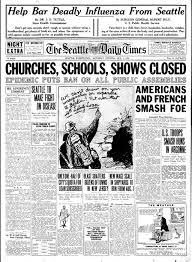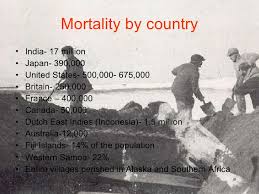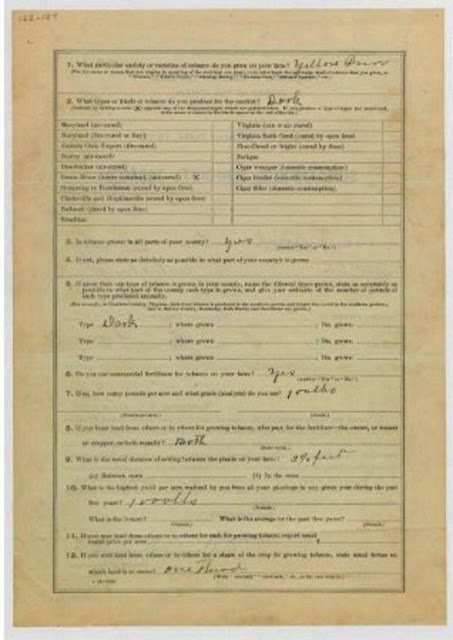James Buchanan (Buck) Coffman was born 28 Jan 1857 and died 8 Jan 1935; he is buried in Point Pleasant Cemetery, Ohio County.
Saturday, December 29, 2018
Wednesday, December 26, 2018
Tobacco census 1910 - William S. Carter
William Silas Carter was born 14 Feb 1876 and was a farmer in the Centertown area of Ohio County. He never married and died 17 Mar 1947 at age 71. He is buried in Waltons Creek Church Cemetery in Centertown.
Saturday, December 22, 2018
Wednesday, December 19, 2018
Saturday, December 15, 2018
Tobacco census 1910 - Calvin C. Borah
In August 1910 the Federal government collected data about the production of tobacco in the various states. A form was mailed to individuals and was filled out and returned to the Census Bureau. I found that fourteen people from Ohio County returned a tobacco census form. Unfortunately the quality of these documents is not very good, some of the hand writing is hard to read, and the information contained in the documents is not earth-shaking but, none-the-less, it might be important to a descendant. I will post them in alphabetical order - the first is Calvin C. Borah.
Calvin Borah was born in 1845 so at the time he filled out this form he was 65 years old. The regular census for 1910 says he lived in Cromwell and was a timber dealer. Calvin lived until 1930. Page one above says that he leased the property where he had a tobacco crop (tenant).
Wednesday, December 12, 2018
Owen Hunter and Oppie Kittinger
This is a photo of Owen Hunter (center in overalls) and Oppie Kittinger (left) with cigars. The man on the right is unidentified. Hunter and Kittinger were related by marriage. The photo was taken at Livermore or Hartford during 1910 - 1920. The photo was contributed to the Kentucky Historical Society by Carmen Kittinger.
Saturday, December 8, 2018
John P. C. Porter
I have only found one Porter family in the 1840 census for Ohio County - it looks like the father was named Oliver or Elvira Porter (probably Oliver Cromwell Porter 1784-1858). I think this is correct and I think the son shown in the above chart was John Philpot Curran Porter born about 1824 (chart says he is 19 years old, so that would be 1821 or so.
Wednesday, December 5, 2018
Stateler Memorial Methodist Church
Saturday, December 1, 2018
1940 Census Maps
The 1940 census maps might help you find
where your ancestors lived and what church, school or cemetery was nearby. Ohio County
When
you find your ancestor listed on the census sheets you will see that the far left column is for the name
of the street or road they lived on and the next column is for their street
number. Of course in rural areas street numbers were not used in 1940. If
nothing is shown for location then the person that prepared the document failed
to fill it out completely, which is often the case. In the upper right of each
page the Enumeration District is shown, which corresponds to the maps. Each
page is dated and signed by the person that took the census. If you are
lucky your ancestor is listed on line 4 or 40 - if so, look at the
supplementary information at the bottom of the page. So, find your ancestor and then use the maps to try to pin-point their location and see what was nearby. If you are a member of Ancestry.com you can see these same maps and those maps may have better detail for viewing on your computer.
Here are the six maps that show all of the 23 enumeration districts:
Wednesday, November 28, 2018
Saturday, November 24, 2018
Tuesday, November 20, 2018
Saturday, November 17, 2018
Wednesday, November 14, 2018
Sunday, November 11, 2018
Kentucky WWI
This is a Service flag or Service banner, also called the
Blue Star Flag or Mother's War Banner. It is machine-stitched, and it is made
of wool bunting with a canvas header. The banner has a white field with a
12-inch wide red border. The white field is made of two vertical segments of
fabric that are stitched together down the center. There is an appliquéd blue
star at the top center of the field with blue appliquéd "103,000"
below the star. In the center of the field, there is red appliquéd letters that
read, "WWI / KENTUCKY
Size is 74" x 48.5"
The numbers on the banner apparently means 103,000 Kentuckians served in World War I and 3,200 died. These figures might not be correct - see https://www.abmc.gov/news-events/news/hometown-boys-kentucky-information-and-statistics-about-wwi-service-members
The above is Courtesy of Kentucky Historical Society.
As for Ohio County, my search found the following:
D.W. = Died of Wounds
D.D. = Died of Disease
D.A. = Died of Accident
K.A. = Killed in Action
W.A. = Wounded in Action
Saturday, November 10, 2018
Daviess County History - Sudie J. Tichenor, wife of James H. Davis
Source Daviess County History:
Also, note that a sister of Mr. Davis, Elminah E. Davis, married Randolph Wimp of Ohio County.
Monday, November 5, 2018
Voting in Kentucky
A short YouTube video from the Kentucky Historical Society about the history of voting in Kentucky:
https://www.youtube.com/watch?v=GG1I1kuYhcs
https://www.youtube.com/watch?v=GG1I1kuYhcs
Sunday, November 4, 2018
1918 Flu Pandemic
My Leach grandfather, Harney Leslie Leach (1877-1918), and my great-grandfather, Samuel William Leach (1851-1918), both died in Ohio County in 1918 from the flu pandemic. This year is the 100th anniversary of that terrible time.
Remembering the 1918 Influenza Pandemic
The Emerging Pandemic
Deadly Second Wave and
Third Waves
Limited Care and Control
Efforts in 1918




Remembering the 1918 Influenza Pandemic
This year marks the 100th anniversary of the
1918 influenza (flu) pandemic that swept the globe in what is still one of the
deadliest disease outbreaks in recorded history.
It is
estimated that about 500 million people or one-third of the world’s population
became infected with this virus, and the number of deaths was estimated to be
at least 50 million worldwide with about 675,000 occurring in the United States United States
The Emerging Pandemic
The 1918 flu pandemic occurred
during World War I; close quarters and massive troop movements helped fuel the
spread of disease.
In the United States U.S.
Deadly Second Wave and
Third Waves
In
September 1918, the second wave of pandemic flu emerged at Camp Devens ,
a U.S. Army training camp just outside of Boston ,
and at a naval facility in Boston U.S. U.S.
Limited Care and Control
Efforts in 1918
In 1918,
scientists had not yet discovered viruses so there were no laboratory tests to
diagnose, detect, or characterize flu viruses. Prevention and
treatment methods for flu were limited. There were no vaccines to
protect against flu virus infection, no antiviral drugs to treat flu illness,
and no antibiotics to treat secondary bacterial infections like pneumonia.
Efforts to prevent the spread of disease were limited to
non-pharmaceutical interventions (NPIs), including promotion of good
personal hygiene, and implementation of isolation, quarantine, and
closures of public settings, such as schools and theaters. Some
cities imposed ordinances requiring face masks in public. New York City
For more info see https://www.smithsonianmag.com/history/journal-plague-year-180965222/

Saturday, November 3, 2018
Wednesday, October 31, 2018
Saturday, October 27, 2018
Wednesday, October 24, 2018
Subscribe to:
Comments (Atom)














































